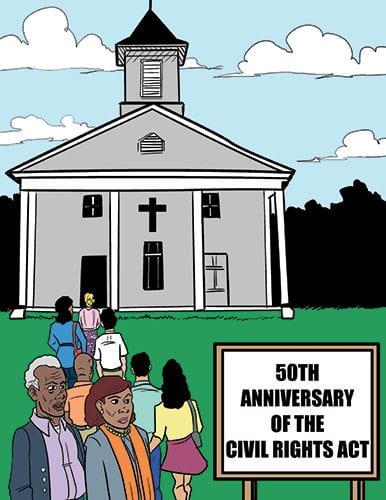
Racial discrimination in education and employment denied African Americans the right to progress in society, and discrimination in places of public accommodation was both inconvenient and demeaning. The Civil Rights Act of 1964 specifically outlawed throughout the country all three of those discriminatory policies. However, a media-driven strategy to marginalize, insult and humiliate African Americans has been underway without impediment for generations. The First Amendment with “freedom of speech or of the press” has provided an impervious protection of the bigotry.
Black men were characterized early on as rapists, lazy or simple-minded. D.W. Griffith’s 1915 film “Birth of a Nation” justified the organization of the clan to protect white women from rapacious blacks. The assertion of such sexual assault was the rationalization for the destruction of Tulsa’s black community in 1921 and the prosecution of the Scottsboro Boys in Alabama in 1931. History has proved that both of these accusations were false, but numerous men have lost their lives to the lynch mobs because of such rumors.
Lincoln Perry often played the role in feature films of Stepin Fetchit, the laziest man in the world. “Amos ‘n’ Andy” was a radio hit from 1928 to 1943. Freeman Gosden and Charles Correll, two white actors, played the roles of two simple-minded black masters of the malapropism. With all of this defamation there was no dignified, heroic black male in Hollywood films until Sidney Poitier, who won the Academy Award in 1964 for “Lilies of the Field.”
Black women were characterized in Hollywood as “Mammy” types or “Aunt Jemima.” Hattie McDaniel won a supporting actress Oscar in 1940 for her role as “Mammy” in “Gone with the Wind.” With so many beautiful black women in films and music now, it is no longer possible to characterize black women as unattractive. Kerry Washington, Tyra Banks, Halle Berry, Beyoncé Knowles-Carter, Iman, Toni Braxton and Naomi Campbell, to name a few, would not fit that description.
While the Civil Rights Act has mollified the impact of racial discrimination, abuse of the privileges afforded by the First Amendment continue. For example, the press currently treats suburban residents hooked on heroin like victims of a medical malaise. By contrast, addicted residents of the center city are simply degenerate junkies.
It is good to celebrate the 50th anniversary of the Civil Rights Act, but Americans must understand that there is still a long road to full equality.






